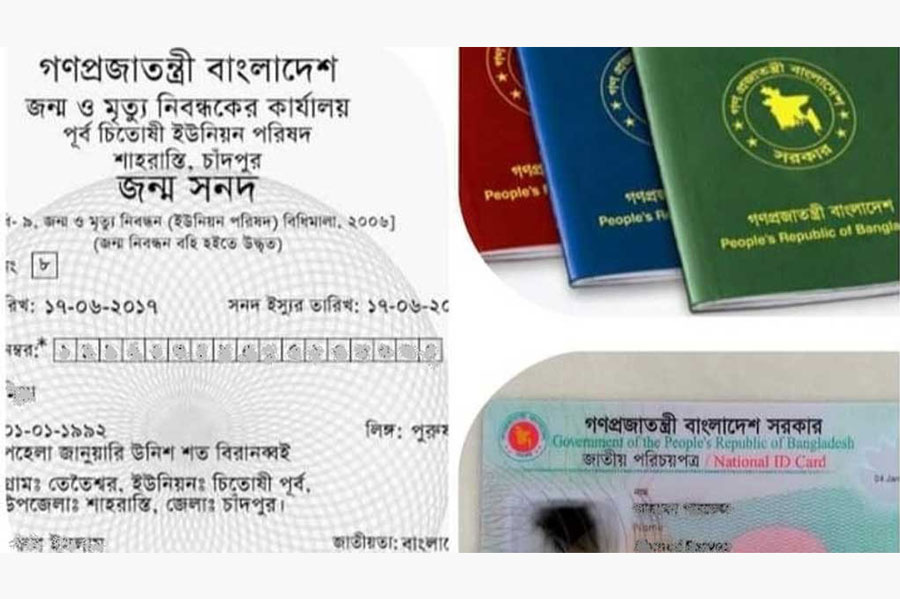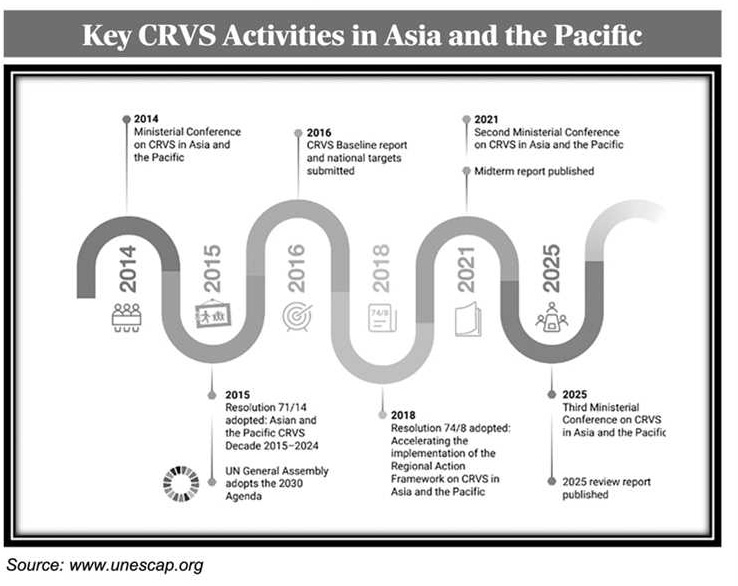
Published :
Updated :

Two decades ago, Bangladesh enacted a law mandating the registration of all births and deaths within 45 days of occurrence. The new law replaced the more than a century-old law administering birth and death registration. Under the new act, titled Birth and Death Registration Act 2004, local government bodies and Bangladesh Missions abroad are empowered as registrars. Later, in 2006, a set of rules also came into effect to simplify birth and death registration. In 2014, ten years after the enactment of the new act, the country achieved a milestone by completing 100 million birth registrations on the online birth registration information system (BRIS). The milestone reflected the country's gradual effort to improve the civil registration and vital statistics (CRVS) system. In the same year, countries in the Asia and Pacific region, under the auspices of the United Nations Economic and Social Commission for Asia and the Pacific (ESCAP), proclaimed 2015-2024 as the Asian and Pacific CRVS Decade. Through the proclamation, 53 members and nine associate members of ESCAP made a commitment to develop a universal and responsive civil registration and vital statistics system by 2024. They also agreed that the people of the region would use the system to ensure their rights and support for good governance, health, and development. As the deadline has already passed, it is time to review the progress made by the countries. Against the backdrop, ESCAP is going to organise Third Ministerial Conference on CRVS in Asia and the Pacific on June 24-26 in Bangkok. The conference will bring together governments and key partners to reflect on regional progress on CRVS. It will also try to identify key actions and enhance commitments towards ensuring universal registration in Asia and the Pacific. To facilitate the conference, ESCAP, last week, released a report titled 'Progress Made on Civil Registration and Vital Statistics in Asia and the Pacific after a Decade of Getting Everyone in the Picture.'
It is now widely recognised across the world that no country can afford to move ahead without having a functional system of civil registration and developing vital statistics based on registration. CRVS is a system to create a comprehensive database by registering all births and deaths in a country. Under the system, birth and death certificates are issued by the relevant authorise smoothly. These certificates are crucial civil documents. The register also compiles cause-of-death information and records marriage and divorce statuses by location, age, sex, and cause.

United Nations (UN) defined civil registration as the 'continuous, permanent, compulsory and universal recording of the occurrence and characteristics of vital events pertaining to the population.' World Health Organisation (WHO) terms the CRVS system 'as the most reliable source of statistics on births, migration, life expectancy, deaths and causes of death.' In other words, the system facilitates the legal identities of the population of a country and thus provides the foundation for 'accessing essential rights and services, from healthcare and education to social protection and legal services.' CR data is also vital for evidence-based policymaking, disaster preparedness and achieving the Sustainable Development Goals (SDGs), according to the ESCAP.
ESCAP report unveiled that the number of unregistered children under five has dropped by 62 per cent in Asia and the Pacific, from 135 million in 2012 to 51 million in 2024. This means 84 million more children today have a recognised name, a legal identity and a stronger foundation for the future. Nevertheless, the report pointed out that 14 million babies are still unregistered by their first birthday each year, meaning many of them may be denied their fundamental right to education and healthcare services due to a lack of official documentation. Thus, countries need to enhance their efforts by making the civil registration process easier and more efficient.
Many countries in the region have reached-or even exceeded-their targets for improving CRVS systems by 2024, which is a matter of celebration. However, some had fallen behind and were still struggling to make the necessary advancements. Success stories from other countries will be helpful for those who are yet to meet their targets. ESCAP reports presented a few success stories as case studies in this connection. Bangladesh is one of the countries whose achievements in the last decade are highlighted in the report. According to the report: "When considering birth registrations within one year of occurrence, 26 out of 50 members and associate members had achieved their set target by 2024. Bangladesh, the Lao People's Democratic Republic and Nepal demonstrated major improvements." Despite significant improvements, Bangladesh's status is still 'in progress' on two key targets: 'birth registration within a year' and 'birth registration of children under five'. The country, however, reached the target on 'issuance of birth certificates', which is fully digitalised now. The government also did not set any target on 'population whose birth has been registered'.
According to the ESCAP report, Bangladesh made better advancements in death registration-related targets. The country is 'in progress' status in 'death registration within a year', and achieved the target on 'recording of causes of death' and 'issuance of death certificates'. There is, however, insufficient data on the country's progress related to the 'reduction of ill-defined causes of death code'.
Reviewing the ESCP report made it clear that most countries began to improve their CRVS systems following the 2014 proclamation. For instance, Bangladesh's efforts to produce vital statistics from civil registration data started seriously in 2016. Almost a decade later, in February this year, the Office of the Registrar General (ORG) and the Bangladesh Bureau of Statistics (BBS) signed a Memorandum of Understanding (MoU) on a formal data-sharing mechanism between the two national agencies. "This breakthrough helps Bangladesh to move beyond the sample vital registration system and toward the production of comprehensive, gender-disaggregated and age-specific vital statistics based on civil registration data, critical for national planning and policies," said the ESCAP report.
Nevertheless, many drawbacks and flaws remain, and the country needs to improve the quality of data as well as upgrade the civil registration mechanism. ESCAP report pointed out that significant inequalities in birth registration were found in Bangladesh, particularly linked to education, wealth and place of residence.
Improving the CRVS is a continuous process and also challenging for populous countries like Bangladesh. Efforts in the last two decades have shown that the country has done well so far, although there are scopes for improvement. Bad governance, coupled with mismanagement, hindered optimal advancement. The upcoming Bangkok conference presents a unique opportunity to revitalise the effort to establish a high-quality and inclusive CRVS system in Bangladesh.


 For all latest news, follow The Financial Express Google News channel.
For all latest news, follow The Financial Express Google News channel.